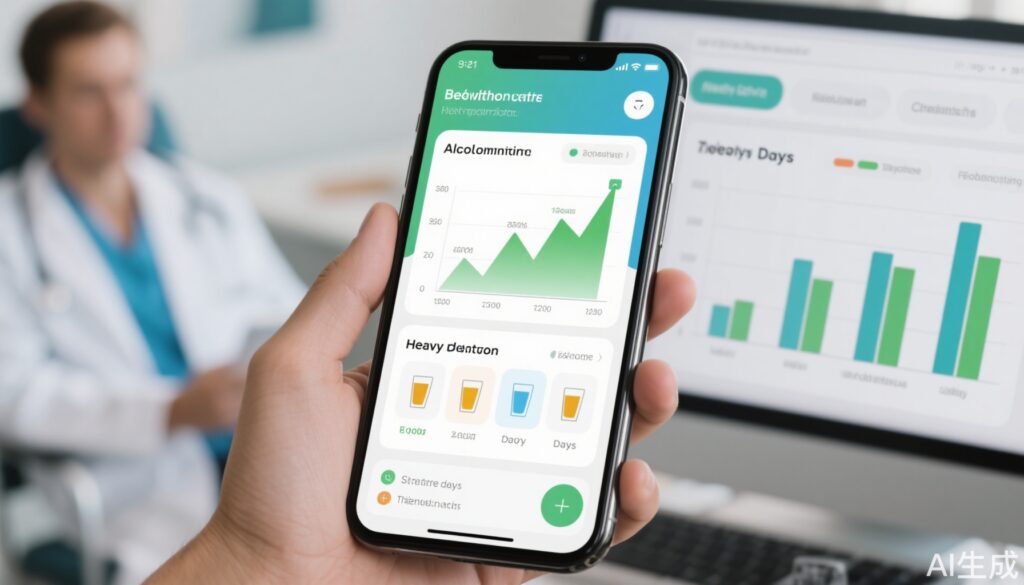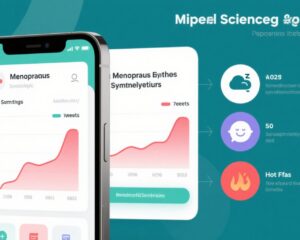Highlights
- ALM-003, a novel digital therapeutic (DTx), significantly reduced heavy drinking days (HDDs) compared to control in alcohol-dependent patients with high or very high drinking risk.
- The intervention integrates daily self-monitoring, personalized feedback, psychoeducational modules, and automated physician support, enhancing psychosocial treatments.
- Safety outcomes showed no adverse events attributable to app use, supporting the integration of DTx into clinical care without increased risk.
- This landmark multicenter RCT substantiates digital therapeutics as an effective adjunct for alcohol dependence management.
Background
Alcohol dependence remains a prevalent global health challenge with substantial morbidity and social burden. Traditional psychosocial interventions, including motivational enhancement therapy and cognitive behavioral therapy, demonstrate efficacy but suffer from barriers such as limited accessibility, adherence issues, and variability in treatment delivery. Digital therapeutics (DTx), defined as evidence-based therapeutic interventions driven by software programs, have gained momentum as innovative modalities to augment conventional care for behavioral disorders including substance use disorders.
ALM-003 was developed to leverage digital technology to support patients with alcohol dependence aiming to reduce heavy drinking. By facilitating daily self-monitoring, delivering individualized feedback, and providing psychoeducation alongside decision support tools for clinicians, ALM-003 targets sustained behavioral change and relapse prevention. Prior to this study, evidence supporting DTx in alcohol use disorders was limited, particularly regarding head-to-head comparisons with conventional approaches.
Key Content
Study Design and Patient Population
This multicenter, open-label randomized controlled trial (RCT) enrolled adults diagnosed with alcohol dependence with high or very high risk drinking levels, specifically excluding those with severe medical, psychiatric, or social complications to isolate the effect of the digital intervention on a more homogeneous population. Participants were randomized to receive a psychosocial intervention enhanced by ALM-003 (intervention group) or a psychosocial intervention paired with a non-interactive drinking diary app (control group) for 24 weeks.
Intervention Description
ALM-003 delivered multiple components:
- Daily self-monitoring prompts for drinking behavior and cravings.
- Personalized, automated feedback based on user input to reinforce behavioral goals.
- Interactive psychoeducational modules covering relapse prevention strategies and coping skills.
- Automated alerts and reports to physicians to facilitate tailored treatment support.
In contrast, the control group had access only to a basic drinking diary without interactive elements or personalized feedback.
Outcomes and Main Findings
The primary outcome was the change in heavy drinking days (HDDs) over 28 days from baseline to Week 12.
Baseline HDD rates were comparable: 19.4 days for intervention participants and 19.1 days for controls. At Week 12, the ALM-003 group reduced HDDs by 12.2 days compared to 9.5 days for controls, yielding a statistically significant between-group difference of -2.79 days (95% CI: -4.67 to -0.90, P=0.004). This difference, though modest, represents meaningful clinical benefit in reducing relapse and harmful drinking patterns.
Safety analysis revealed comparable adverse event rates between groups (32.9% intervention vs 33.6% control), with none attributable to the digital application. This supports the safety of incorporating DTx into treatment protocols without added risk.
Comparative and Contextual Evidence
Although data on digital therapeutics for alcohol use disorders remain emergent, other studies have demonstrated feasibility and moderate efficacy of smartphone applications to enhance adherence and self-monitoring. Meta-analyses of behavioral interventions incorporating digital components (e.g., text messaging, app-based CBT modules) indicate improvements in drinking outcomes but often lack large randomized trials with rigorous controls.
ALM-003’s multicenter, randomized design with a control comparator strengthens the evidence base, showcasing how digital augmentation can concretely improve clinical endpoints over standard psychosocial approaches.
Expert Commentary
This well-conducted RCT provides robust clinical evidence endorsing ALM-003 as an efficacious and safe adjunct in alcohol dependence treatment. The digital therapeutic’s design aligns with behavioral change theories emphasizing self-monitoring and personalized feedback, maximizing engagement and skill acquisition.
While the 2.79-day reduction in HDDs is statistically significant, future investigations might explore sustained long-term efficacy beyond 12 weeks and potential effects on secondary outcomes such as abstinence rates, quality of life, and relapse prevention. Larger and more diverse cohorts could verify generalizability across populations with differing comorbidities and higher severity.
Guideline committees for alcohol use disorder management may consider incorporating such digital therapeutics as complementary tools augmenting psychosocial and pharmacologic treatments. Considering safety profiles, DTx can alleviate resource constraints with scalable platforms requiring minimal incremental healthcare personnel effort.
Mechanistically, digital therapeutics leverage neurobehavioral principles of feedback loops and self-regulation, potentially modifying neural circuits implicated in craving and reward dysregulation. Integration with wearable biosensors or ecological momentary assessments could further enhance personalization and precision management.
Conclusion
ALM-003 demonstrates significant efficacy and safety in reducing heavy drinking days among alcohol-dependent individuals at high risk, marking a critical advancement in digital therapeutics for substance use disorders. This trial paves the way for wider clinical adoption and underscores the transformative potential of technology-enabled interventions to address chronic, relapsing conditions. Future research should prioritize long-term effectiveness, diverse patient inclusion, mechanistic exploration, and cost-effectiveness to optimize deployment in routine care.
References
- So R, Nouso K, Matsushita S, Yoshiji H, Yuzuriha T, Hida E, Nishimura H, Takagi Y, Horie Y. Efficacy and safety of a digital therapeutic for alcohol dependence: A multicenter, open-label, randomized controlled trial. Psychiatry Clin Neurosci. 2025 Jul 28. doi: 10.1111/pcn.13874. Epub ahead of print. PMID: 40719411.
- Garnett C, Crane D, West R, Brown J, Michie S. Behavior change techniques used in digital behavior change interventions to reduce excessive alcohol consumption: A meta-regression. Transl Behav Med. 2018;8(5):815-830. doi:10.1093/tbm/iby020.
- Donoghue K, Patton R, Phillips T, Deluca P. Implementation and Outcomes of a Digital Alcohol Intervention in Clinical Practice: Systematic Review. J Med Internet Res. 2022;24(3):e32643. doi:10.2196/32643.


